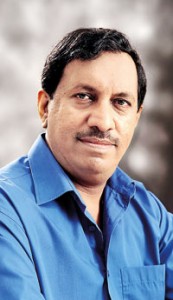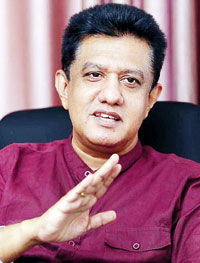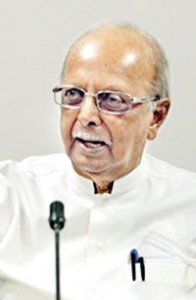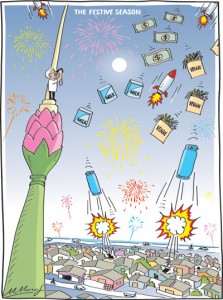Columns

Anura Priyadharshana Yapa
- Parliament committee heads unhappy over President’s sudden move; speculation that it was aimed at quashing probes and removing present committee heads
- Cabinet divided over IMF assistance; COPF chairman Priyadarshana Yapa slams Cabraal, says he acts more like a politician than a responsible CB Governor
- Attorney General objects to Cabinet Ministers appearing in Supreme Court against Government; cites collective responsibility
Parliament was originally supposed to reconvene on January 11 for its first session of the New Year. All that changed when the President on Sunday issued a gazette notification, proroguing Parliament from midnight on December 12 till 10 am on January 18. Just after issuing the gazette, President Rajapaksa left for Singapore on a private visit. He returned later in the week. The President is well within his rights; the Constitution’s Article 70 allows him to prorogue Parliament. He is not obliged to give reasons for his decision. Yet, the timing of the move has raised many uncomfortable questions for the Government.
It was only last week, during the final day of the Budget 2022 debate, that National People’s Power (NPP) Leader Anura Kumara Dissanayake tabled in Parliament a copy of the controversial Yugadanavi agreement that the Government had kept hidden from public view. Such was the secrecy that had surrounded the agreement till then that according to Mr Dissanayake, even some Cabinet Ministers who had not seen the agreement had approached him in Parliament asking for a copy. The dramatic revelation of the agreement overshadowed the Government’s resounding passage of the Budget by a majority of 93 votes, when various factions within the Government set aside their differences to pass Finance Minister Basil Rajapaksa’s first Budget by a two-third majority.
According to Article 33 of the Constitution, President Rajapaksa will have the opportunity to ceremonially open Parliament and deliver the Government’s Policy Statement at the beginning of the new session on January 18. Yet, if all that the President wanted to do was explain his Government’s policy and how they intend to overcome the various challenges before the country, he could well have addressed the nation as he has done on several occasions over the past two years.

Prof. Charitha Herath
Even some members of Mr Rajapaksa’s Cabinet were caught unawares by the sudden move to prorogue Parliament. While defending the decision, some ministers told the Sunday Times they were in the dark as to the reasons behind it.
“The President has the right to prorogue Parliament and he does not need to explain his reasons to the country beforehand,” Lands Minister S.M. Chandrasena said. The minister, though, added he expected that the President would explain those reasons during his address to Parliament on January 18. Wildlife Minister C.B. Rathnayake said the prorogation was “nothing unusual,” and there was “no need to announce reasons”. “The Opposition will always say there are sinister motives behind it. If the Yugadanavi issue was not there, they would claim it was because of other issues such as the gas cylinder issue, or the teachers’ salary matter. The Government does not need to take decisions according to the requirements of the Opposition.”
Many in the Opposition and even some in the Government see far more sinister motives behind the sudden move to prorogue Parliament. This is because prorogation seriously affects the workings of Parliament and undermines some of its key functions.
The effect of a prorogation is that all current business before the House is suspended and all proceedings pending at the time are quashed except impeachments. Once prorogation occurs, issues and motions which have not been duly considered by Parliament will be suspended and MPs should again act in accordance with the Standing Orders. Moreover, all Committees other than the Committee on High Posts and the Select Committees should be re-appointed at the new session. This means that all the following Committees have now ceased to function and will have to be reconstituted: the Committee on Parliamentary Business; Committee on Standing Orders; House Committee; Committee on Ethics and Privileges; Legislative Standing Committee; Ministerial Consultative Committees; Committee on Public Accounts (COPA); Committee on Public Enterprises (COPE); Committee on Public Finance (COPF); the Committee on Public Petitions; and the Backbencher Committee.
There have been reports over the past several weeks that some members of the Government and even the Cabinet are deeply unhappy with the actions taken by some of these Parliamentary Committees, most notably the COPF, COPE and COPA. The chairpersons of all these committees are Government MPs with Anura Priyadharshana Yapa chairing the COPF, Prof. Charitha Herath chairing COPE and Prof. Tissa Vitharana heading COPA.

Prof. Tissa Vitharana
Large-scale frauds
Investigations by these committees over the past year have exposed large scale frauds, corruption and other misdeeds that have resulted in a significant loss of state revenue. Their efforts have been even more commendable given that the committees were severely hampered by COVID-19, which restricted the number of days they could meet.
It was the COPF’s investigation into the so-called ‘sugar scam’ that forced the Finance Ministry to admit through a report to the committee that its decision to suddenly reduce the Special Commodity Levy imposed on sugar from Rs. 50 a kilo to 25 cents a kilo in October last year had resulted in the loss of Rs. 15.9 billion in tax revenue. The admission lent credibility to allegations that the decision was taken to benefit a single company which had imported a massive quantity of sugar with prior knowledge of the impending tax reduction.
Mr. Priyadarshana Yapa said he did not know whether there were moves to remove him as the head of COPF and other chairpersons of some committees. He, however, stressed he did not know why Parliament was prorogued and could not explain the President’s decision.
“A President usually prorogues Parliament when he wants to defuse a situation that has arisen between himself and Parliament. There was no such issue in this case,” Mr Yapa pointed out. He noted that the President must adhere to the democratic framework that has been laid out by the Constitution and must not do things haphazardly.
“He (President) may have had a very good reason for proroguing Parliament, but given that reason has not been explained, it has naturally created a dialogue within society and has already conveyed a wrong message.”
Prof. Charitha Herath, who headed COPE, said his “honest feeling” was that there was no political need for the prorogation. “I am looking forward to seeing the argument on the issues that led to this decision.”
On how the prorogation would affect COPE, Prof. Herath explained that all reports that the committee was yet to table in Parliament would now cease, but hoped that the new COPE that would be constituted next year would make use of the important work his committee had done when moving forward.
He revealed that two reports on COPE investigations into as many as 16 key state institutions could not be tabled in Parliament owing to the prorogation as the committee’s work had now ceased. These include institutions such as Sri Lanka Cricket, the Board of Investment, Sri Lanka Insurance, the Ceylon Petroleum Corporation and Sri Lankan Airlines. “The committee had summoned officials of these institutions and held inquiries while the Attorney General’s Department had also submitted its recommendations. The investigations have been completed, but we were not able to table the reports as they are still being translated,” Prof. Herath added. See box for a full list of the institutions covered in the reports which COPE will not be able to submit owing to the prorogation.
Once appointed, the new COPE could revise previous summons of these state institutions and publish their findings or it could opt not to publish any of the findings, Prof. Herath said.
“I have heard things. I don’t know if they are true,” he said, pointing to the claims that the prorogation was to remove him and other heads of parliamentary committees and reconstitute new ones. “However, I can say that I have done the correct things according to the principles we had agreed with the people. I can’t see anything wrong with the way I handled my duties as chair of COPE,” Prof. Herath said.
Tissa Vitharana: They can kick me out
Meanwhile Prof. Tissa Vitharana noted that since he took over as chairperson, COPA had initiated investigations on the three key institutions that brought about 90% of revenue for the Government Budget. These institutions are the Department of Inland Revenue, the Department of Excise and Sri Lanka Customs. “In the course of our investigations, we unearthed some terrible frauds. I have put these down in three separate reports that have been tabled in Parliament. Those are public documents so no one can erase them,” he remarked.
Nevertheless, other investigations being conducted by COPA will now cease. Whoever succeeds him as chair, though, can always go back to the work the previous committee had done and move forward from there, Prof. Vitharana noted.
“They (Government) can kick me out if they wish. Reports have come back to me that one of the reasons for this move (prorogation) is to make changes to these committees,” the veteran politician added.
Prof. Vitharana, who is also the General Secretary of the Lanka Sama Samaja Party (LSSP), one of the partners in the ruling Sri Lanka Podujana Peramuna-led coalition, said the Government had brought such pressure on him before. “When I was appointed Governor of the North-Central Province, I effected many changes that were designed to increase the GDP (Gross Domestic Product) of the province. I was then pressurised to appoint unsuitable individuals to positions and I refused to oblige. They then asked me to resign and sign nomination papers from the National List so that they could appoint me as a Cabinet Minister. I only served as Governor for three months.”
Prof. Vitharana had expected the post of Minister of Science and Technology since he had served in that position for five years during the Rajapaksa Government from 2010-2015 and had done much to improve the sector. “But in the end, I was not named a Cabinet Minister. I wasn’t named as any minister at all and was just an MP.”
He pointed out that the Government had also not given him any responsibility when tackling the COVID-19 pandemic though he had been on the expert advisory panel for viral diseases at the World Health Organisation (WHO) in Geneva for 25 years. “All this is beyond my understanding.”
Opposition MPs have also weighed in on the matter in recent days. NPP National List MP Dr Harini Amarasuriya, who is also a member of COPA, said the move by the President to prorogue Parliament was disruptive for the committee’s work. “We have only been functioning for just over a year and COVID-19 has also been severely disruptive to our work. It also takes some time for a committee like this to get to know each other and work together. I feel like we had actually got to that point and we had worked out a schedule to do a lot of work.
The committee had been investigating many key institutions with institutions like Sri Lanka Customs being a huge undertaking. COPA was also planning to call officials of the nine provincial councils before it early next year. “All our work has now been disrupted and the new committee will have to start from scratch. None of us is also aware of whether we will be reappointed to the committee or not.”
The tabling of the Yugadanavi agreement in Parliament by the NPP leader had also revealed how deeply problematic the agreement is, Dr Amarasuriya noted. “If the President thinks that he can divert attention from the agreement by proroguing Parliament, it has done the complete opposite.”
She added that it was difficult to understand the President’s decision. “I have actually given up trying to understand how his mind works, but this move is completely unacceptable. The President owes this country an explanation.”
Amid the continued economic and political turmoil, Finance Minister Basil Rajapaksa left for the US via Dubai unannounced. It was said to be a private visit. Foreign Minister G.L. Peiris will oversee duties as Acting Finance Minister while Mr Rajapaksa is away. The move by Basil Rajapaksa to leave the country was heavily criticised by Opposition MPs, who claimed the minister had gone on “holiday” while the masses were suffering from severe economic hardship. Mr Rajapaksa is a US citizen and there was heightened speculation as to why he had suddenly left the country. “He has gone home for Christmas,” wisecracked an Opposition MP.
Sections of the Government scrambled to explain reasons for the visit. At a media briefing at the SLPP head office on Wednesday, SLPP Youth Wing member Buddhika Wickramadara said Minister Rajapaksa had left on a “short holiday” but would be back soon. Lands Minister S.M. Chandrasena, though, contradicted this, telling the Sunday Times that he did not believe Mr Rajapaksa would go on holiday at such a time. “As far as I know, Basil Rajapaksa is someone who works 18 hours a day. I’m sure his overseas trip has something to do with trying to find solutions to the economic problems the country is facing.” Wildlife Minister C.B. Rathnayaka said “even politicians have problems like anyone else,” adding that he believed Mr Rajapaksa had left to attend to a personal matter.
In any event, Mr Chandrasena said the Government had allocated a large amount of funds towards ensuring food security in the New Year. “I agree that vegetable prices are high but we believe that prices will stabilise in about two months. Meanwhile, each Grama Niladhari Division will get up to Rs. 10 million to improve the lives and livelihoods of the people. The next few months will indeed be tough, but by April, I think, the economic situation will improve,” he predicted.
Cabinet divided over IMF assitance
Mr Rajapaksa’s departure comes as the Cabinet continues to be divided on whether to seek a bailout from the International Monetary Fund (IMF). The Cabinet is reported to be divided almost down the middle on the subject, with one group strongly advocating seeking assistance while the other group strongly opposes it. A final decision is deferred owing to this disagreement. Meawhile, the rating agency Fitch on Friday downgraded Sri Lanka to ‘CC’ from ‘CCC’, pointing out there was an increased probability of default with regard to debt repayments.
There are strong differences of opinion within Government circles even outside the Cabinet. SLPP MP Anura Priyadharshana Yapa said the Government should go to the IMF as it would help instil investor confidence.
He said the current economic crisis has come about as a result of years of neglect by policy makers who did not do enough to develop Sri Lanka’s export-oriented production. This is in contrast to other countries in the region including India, Vietnam and Bangladesh. “I see this as a tragedy of our policy makers”.
He pointed out that the country now has to spend a large amount of foreign exchange to import essentials like food, medicines, oil, gas and spare parts, but doesn’t have the revenue required to do so.
Stressing that time was running out, Mr Yapa said while redoubling efforts to improve exports, the Government needed to seek IMF help. He blasted the stance taken by Central Bank Governor Ajith Nivard Cabraal that IMF assistance was not required. Mr Cabraal recently resigned from his state ministerial position and Parliament to take up the post of CBSL Governor for a second time. “I have no personal vendetta against anyone, but he (CBSL Governor) is acting more like a politician than a responsible Governor. He must think about managing the exchange crisis and the banks. That’s his job,” Mr Yapa remarked.
In the company of those who firmly oppose going to the IMF is Prof. Tissa Vitharana, who insisted that accepting IMF conditions for a bailout would be disastrous for the country. The previous Yahapalana Government followed the neo-liberal policies of the IMF and it was rejected by the people, the left-wing LSSP General Secretary stressed. However, his party leader of yesteryear, Dr N.M. Perera was a frequent visitor to the Washington-based IMF and World Bank during his tenure as Finance Minister. It was also a time when the country was facing a financial crisis and the Minister earned the sobriquet No Money Perera.
Yugadanavi court case
Differences within the Government continue to play out publicly in other ways, including over the Yugadanavi agreement. A five-judge bench of the Supreme Court began hearings into Fundamental Rights petitions filed challenging the agreement. While Cabinet members have also been cited as respondents in the petitions, three of them — Wimal Weerawansa, Udaya Gammanpila and Vasudewa Nanayakkara — have also filed affidavits in support of the FR petitions challenging the agreement.
During the hearings on Friday, Attorney General Sanjaya Rajaratnam objected when President’s Counsel Uditha Egalahewa, who had been retained by the three ministers as private counsel, rose to make his submissions in support of the petitions. The AG insisted that the ministers are bound by the Constitution to safeguard the principle of collective responsibility of the Cabinet and that their affidavits were unconstitutional. The Court, however, asked the AG to raise those objections during his own submissions and allowed Mr. Egalahewa, PC to proceed. The hearings will continue next week.
China in the north
Meanwhile, a high-level Chinese Embassy delegation led by Ambassador in Sri Lanka Qi Zhenhong undertook a high-profile three-day visit to the Northern Province this week. The visit raised ‘concerns’ among both local Tamil political parties and neighbouring India, which has a Consulate General office presence in Jaffna.
The visit was billed as focusing on extending assistance to development projects and improving fisheries technology. Apart from the ambassador, four officials along with a Chinese military officer attached to the embassy were part of the delegation.
During the vist, the ambassador and male staff of the delegation dressed in veshti (cultural attire of Tamils) and without shirts also visited the iconic Nallur Kandaswamy Kovil. The other devotees in the temple were taken aback when the Chinese diplomats entered the kovil as per the local custom imposed by the temple for centuries on the basis of ensuring equality of all before God Skanda. The move struck a chord in public discussion, particularly on social media with users appreciating the Chinese delegation respecting traditional customs of local communities.
However, it is no secret that, in recent years, China has been actively making inroads into the former war-torn province despite India’s unwritten policy of any development initiatives in both the Northern and Eastern parts of the country should be from the Indian side owing to its “security concerns.” The development of Kankesanthurai Port, Palaly International Airport and leasing of oil tank farms in Trincomalee are some of the examples of Indian involvement when it comes to development initiatives in both provinces.
China, meanwhile, has slowly expanded its presence in the province through road development projects and various construction projects secured through both Government and International Non-Governmental organisations-led development initiatives. China Harbour Engineering Company (CHEC), a subsidiary of state-owned China Communications Construction Company Limited (CCCC). It has an office in Chavakachcheri, some 20 kilometres from Jaffna town.
India recently intervened when a Chinese company secured projects to construct three renewable energy plants in the Northern islands. As the Sunday Times exclusively reported (February 7, 2021), after India lodged a strong protest with the Government on ‘security grounds’ since the islands were located a few kilometres away from India’s Southern coast, the Government had to terminate the tenders and India agreed to develop the three power plants under an Indian Government grant.
After Sri Lanka terminated the tenders, Soar Hybrid Technology of China which secured the Asian Development Bank (ADB) bid to build hybrid renewable energy projects in the Northern islands signed contracts earlier this month with the Maldivian government for the design, supply, installation and maintenance of grid-tied solar PV-diesel hybrid power generation plants in all 12 inhabited islands of Thaa Atoll. In a parting shot, they said in a press release that they were going to the Maldives because a third country objected to the Sri Lankan project.
| Following is a list of key institutions the Committee on Public Enterprises (COPE) had investigated and completed hearing. However, the findings were yet to be published as the reports were still being translated. The prorogation of Parliament means that the COPE’s findings on these institutions will no longer be published:• Independent Television Network (ITN) • Ceylon Petroleum Corporation (CPC) and Ceylon Petroleum Storage Terminals Ltd. (CPSTL) • Sri Lanka Bureau of Foreign Employment (SLBFE) • Coconut Development Authority • Sri Lanka Insurance Corporation • Lanka Mineral Sands Ltd. • Sri Lanka Cricket (SLC) • National Livestock Development Board (NLDB) • University of Peradeniya • Postgraduate Institute of Science (PGIS) • Board of Investment (BOI) • Gal Oya Plantations Ltd. (GOPL) • National Institute of Business Management (NIBM) • University Grants Commission (UGC) • Sri Lanka Transport Board (SLTB) • SriLankan Airlines | |
Buying or selling electronics has never been easier with the help of Hitad.lk! We, at Hitad.lk, hear your needs and endeavour to provide you with the perfect listings of electronics; because we have listings for nearly anything! Search for your favourite electronic items for sale on Hitad.lk today!


Prorogation may be presidential prerogative, but politics plays a part